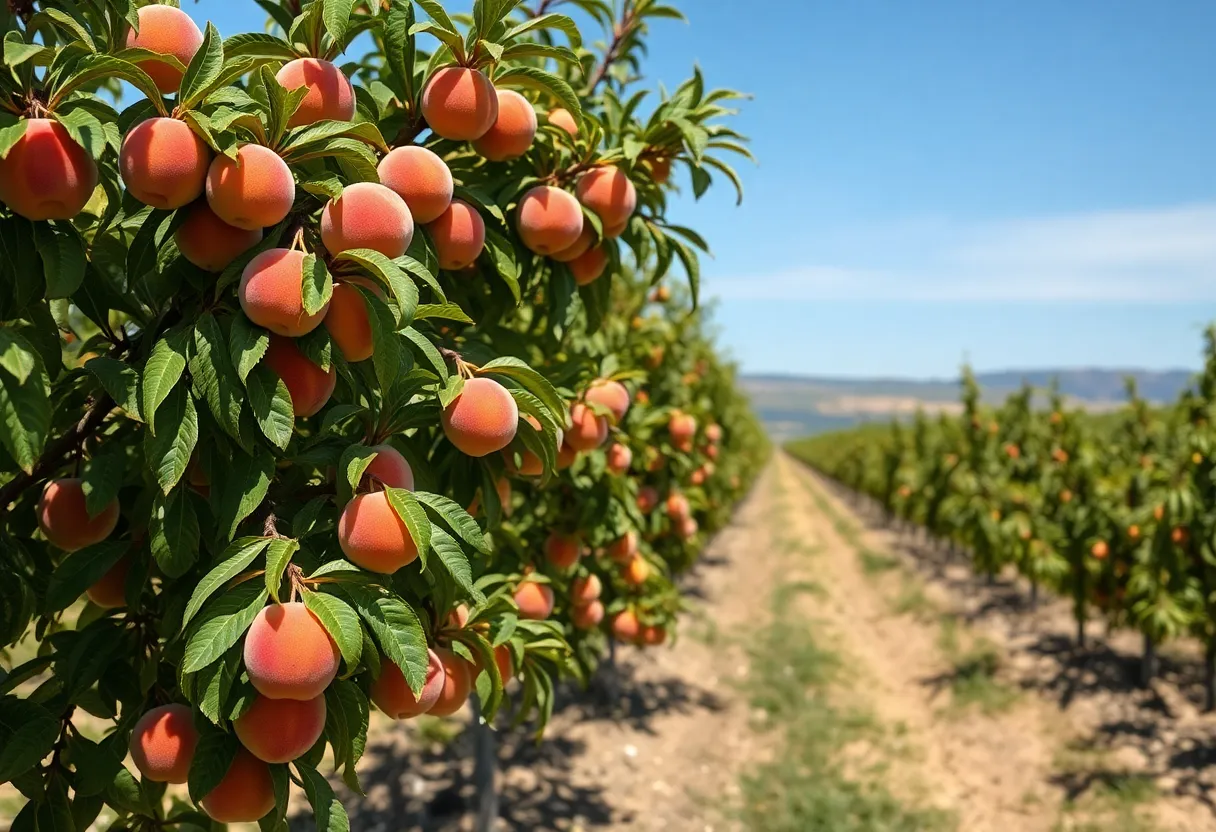News Summary
Peach farmers in California, particularly the Masumoto Family Farm, are experiencing a significant 30% decrease in peach harvest due to climate change-related warmer winters. The irregular cold weather has disrupted peach tree growth cycles, leading to increased crop failures and market price hikes. Similar challenges are also faced by growers in South Carolina and Georgia, compounding the concerns for peach farming across the nation. Climate change continues to threaten both the quality and yield of peaches, pushing farmers to explore various strategies to mitigate losses.
California peach farmers are facing significant challenges this year, with the Masumoto Family Farm in California’s Central Valley reporting a 30% decrease in peach harvests attributed to the effects of warmer winters connected to climate change. This decline not only affects the trees themselves but also the livelihoods of growers who rely on the 12-week peach harvest for their income.
The disrupted sleep cycles of peach trees due to inconsistent cold weather have been a major factor in this year’s reduced yields. Growers depend on a certain number of hours below 45 degrees Fahrenheit during winter months for the trees’ nutrient regulation. This past winter, fluctuating temperatures and unseasonably warm days negatively impacted not only peaches but also other stone fruits such as plums, apricots, and cherries. Some farmers have reported complete crop failures as a result of these extreme weather conditions.
According to agricultural experts, the warm winters have prevented trees from maintaining essential carbohydrates in their roots, further complicating their growth and fruiting processes. In response to these challenges, consumers are noticing rising prices in the market. Prices for yellow peaches have increased by 23 cents per pound, while white peaches are up by 17 cents.
Despite the difficulties, the Masumoto family is managing to maintain some level of production. By using traditional furrow irrigation, which promotes soil health, the farm is able to pack and ship around 10,000 pieces of fruit daily. This method contrasts sharply with modern drip irrigation, which often focuses solely on individual plants rather than supporting overall soil vitality.
Across the country in South Carolina, peach growers are grappling with their own challenges, particularly a late freeze that has decimated approximately 70% of the peach harvest. The situation has been similarly dire in Georgia, where losses are even steeper, with only 5% of its peaches surviving a series of late freezes compounded by ongoing climate issues.
Peach farming is particularly vulnerable to weather fluctuations, making it a high-risk venture compared to other crops. In light of recent harvest problems, many farmers are exploring various strategies to mitigate losses. These include taking out crop insurance and investing in protective measures, such as wind machines and burning straw to stave off frost damage.
The effects of climate change and the consequent warmer winters have also led to early blooming in peach trees, ultimately disrupting the timing of the harvest. While the current situation is concerning, agricultural experts express cautious optimism about the future production of peaches due to advancements in developing varieties that require fewer chill hours.
Historically, Georgia was the leading peach producer before South Carolina overtook it. The peach industry in the United States is vital, both culturally and economically. In South Carolina alone, peach farming spans 15,500 acres and yields over $98 million annually, underscoring the fruit’s importance to the regional economy and identity.
It is important to note that an emerging disease, known as phony peach disease (PPD), has begun to affect peach quality and yield, adding another layer of risk for farmers navigating the challenges presented by climate change. Increased awareness of the difficulties faced by peach farmers can foster understanding and support for the industry as it seeks to adapt to these evolving conditions.
Overall, the impact of climate change on peach harvests in both California and South Carolina illustrates the broader challenges in agriculture, emphasizing the need for continued adaptation and support for local farming communities.
Deeper Dive: News & Info About This Topic
- CBS News: California Peach Harvests
- Wikipedia: Climate Change
- The Guardian: Peach Harvest Challenges
- Google Search: Peach Harvest Challenges
- New York Times: Peaches in the Age of Climate Change
- Google Scholar: Peach Harvest Climate Change
- Fox Weather: Peach Production and Weather
- Encyclopedia Britannica: Peach

Author: STAFF HERE COSTA MESA WRITER
The COSTA MESA STAFF WRITER represents the experienced team at HERECostaMesa.com, your go-to source for actionable local news and information in Costa Mesa, Orange County, and beyond. Specializing in "news you can use," we cover essential topics like product reviews for personal and business needs, local business directories, politics, real estate trends, neighborhood insights, and state news affecting the area—with deep expertise drawn from years of dedicated reporting and strong community input, including local press releases and business updates. We deliver top reporting on high-value events such as the OC Fair, Concerts in the Park, and Fish Fry. Our coverage extends to key organizations like the Costa Mesa Chamber of Commerce and Boys & Girls Clubs of Central Orange Coast, plus leading businesses in retail, fashion, and technology that power the local economy such as Vans, Experian, and South Coast Plaza. As part of the broader HERE network, including HEREAnaheim.com, HEREBeverlyHills.com, HERECoronado.com, HEREHollywood.com, HEREHuntingtonBeach.com, HERELongBeach.com, HERELosAngeles.com, HEREMissionViejo.com, HERESanDiego.com, and HERESantaAna.com, we provide comprehensive, credible insights into California's dynamic landscape.


